外研版英语九年级下册 Module 4 Unit 1 You must be careful of falling stones. 课件(共24张PPT)
文档属性
| 名称 | 外研版英语九年级下册 Module 4 Unit 1 You must be careful of falling stones. 课件(共24张PPT) | 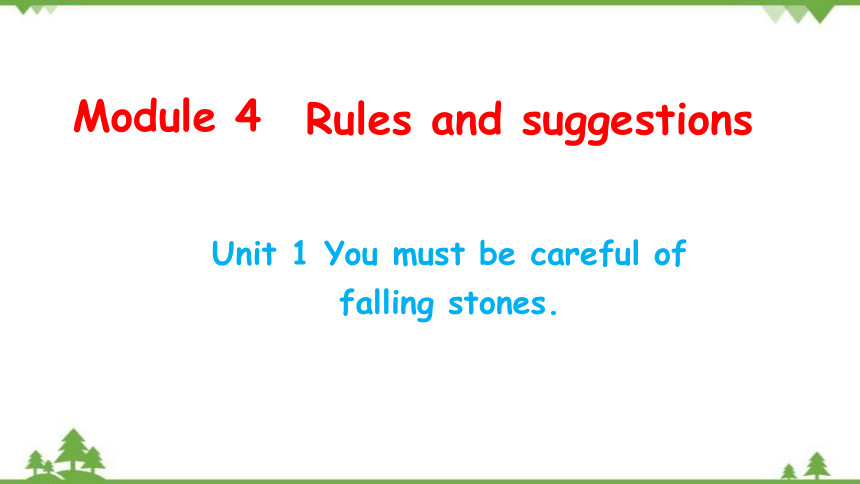 | |
| 格式 | pptx | ||
| 文件大小 | 408.3KB | ||
| 资源类型 | 教案 | ||
| 版本资源 | 外研版 | ||
| 科目 | 英语 | ||
| 更新时间 | 2023-03-04 09:03:25 | ||
图片预览

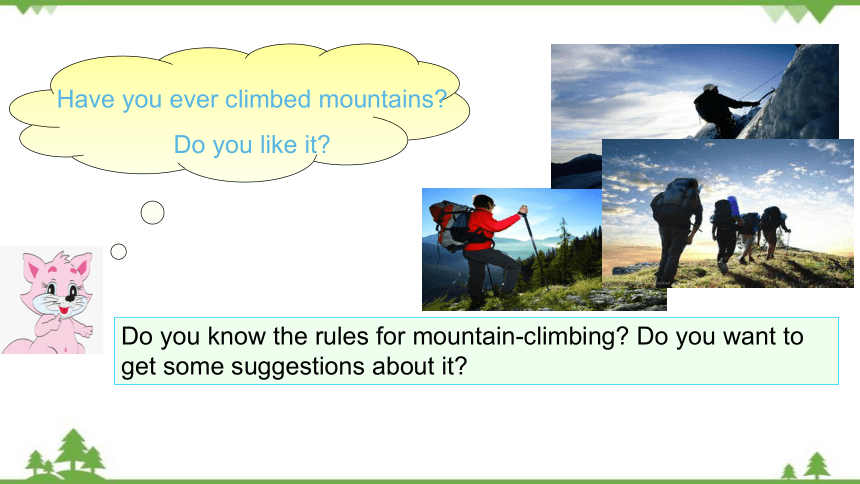
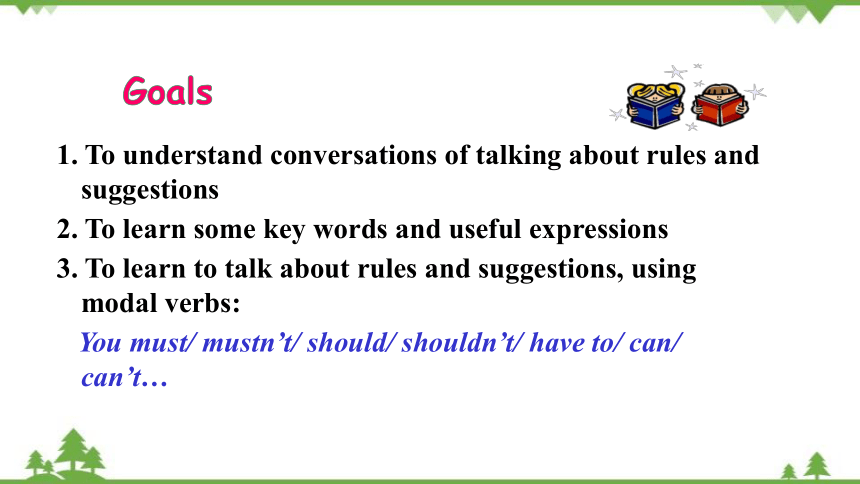
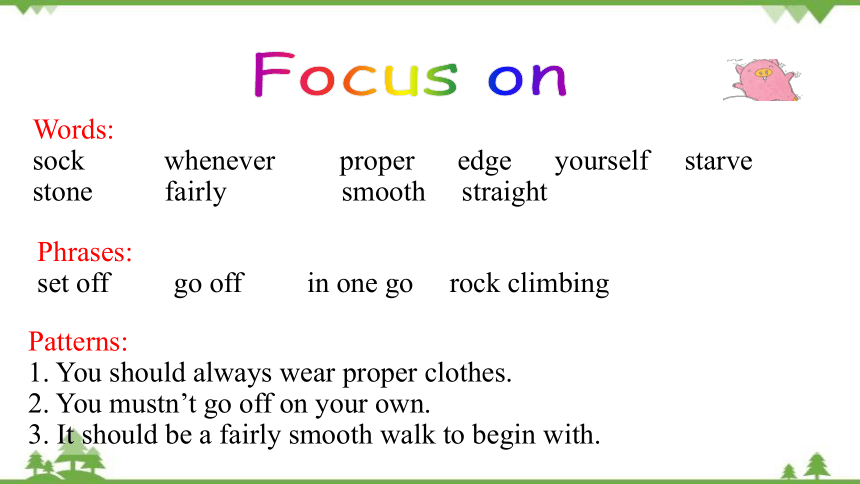

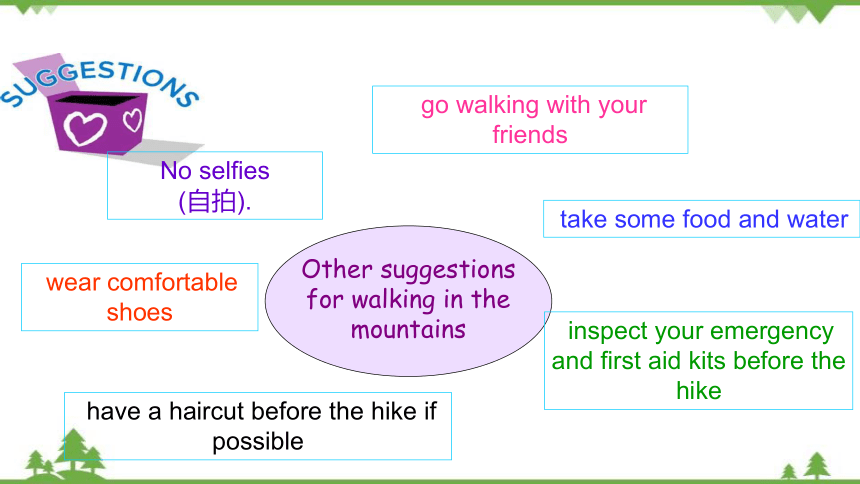
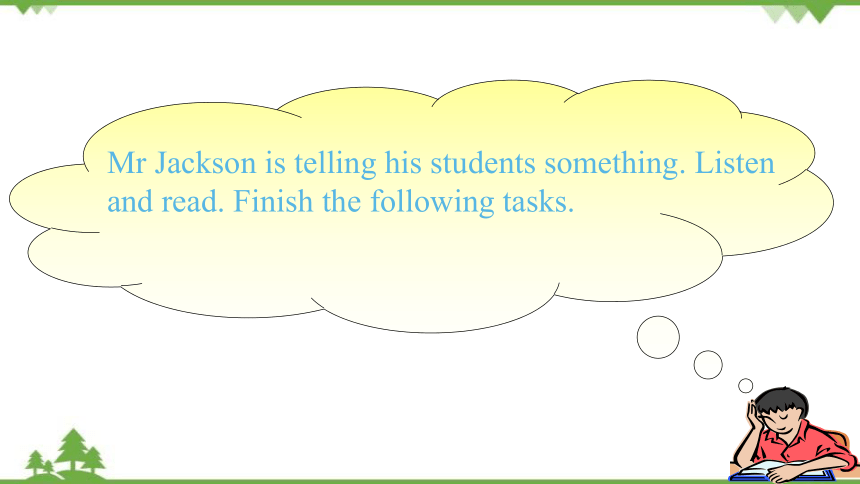
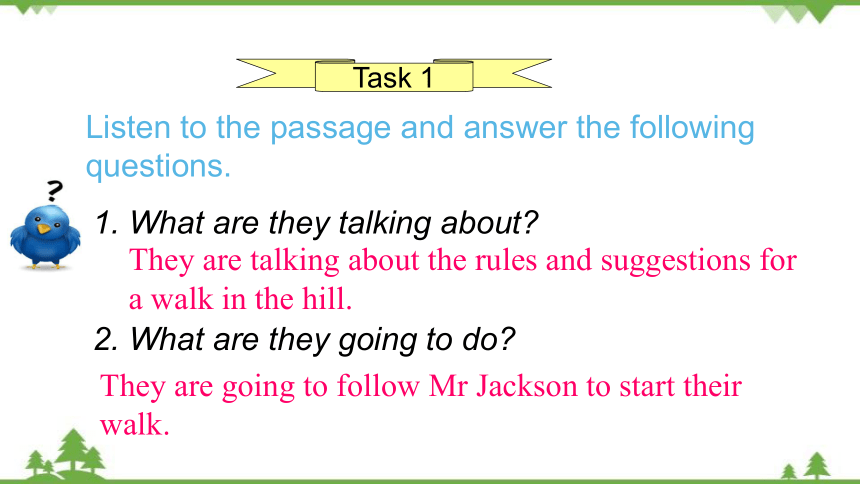
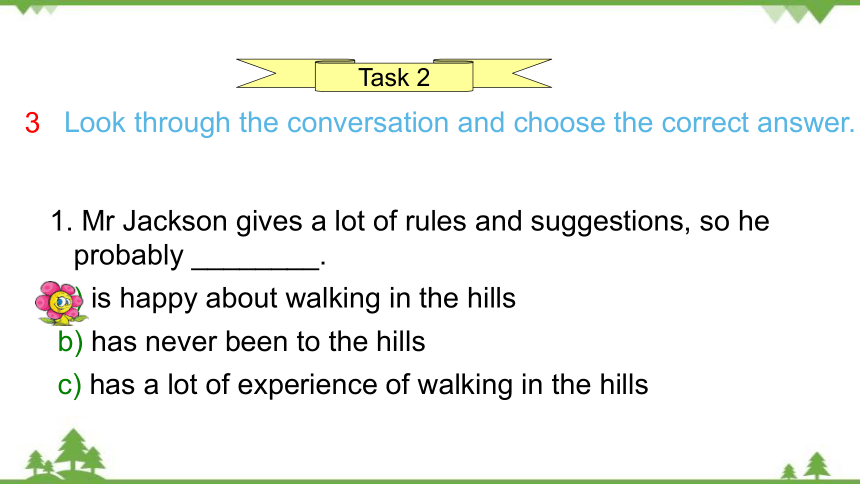
文档简介
(共24张PPT)
Unit 1 You must be careful of
falling stones.
Rules and suggestions
Module 4
Have you ever climbed mountains
Do you like it
Do you know the rules for mountain-climbing Do you want to get some suggestions about it
1. To understand conversations of talking about rules and suggestions
2. To learn some key words and useful expressions
3. To learn to talk about rules and suggestions, using modal verbs:
You must/ mustn’t/ should/ shouldn’t/ have to/ can/ can’t…
Goals
Words:
sock whenever proper edge yourself starve
stone fairly smooth straight
Phrases:
set off go off in one go rock climbing
Patterns:
1. You should always wear proper clothes.
2. You mustn’t go off on your own.
3. It should be a fairly smooth walk to begin with.
Focus on
Look at the photo. Then say what suggestions you can give to people who go walking in the mountains.
Don’t climb.
You mustn’t make fire here.
Be careful! Don’t fall into the deep water.
take some food and water
go walking with your friends
inspect your emergency and first aid kits before the hike
wear comfortable shoes
have a haircut before the hike if possible
No selfies
(自拍).
Other suggestions for walking in the mountains
Mr Jackson is telling his students something. Listen and read. Finish the following tasks.
Listen to the passage and answer the following questions.
Task 1
1. What are they talking about
2. What are they going to do
They are talking about the rules and suggestions for a walk in the hill.
They are going to follow Mr Jackson to start their walk.
Look through the conversation and choose the correct answer.
3
Task 2
1. Mr Jackson gives a lot of rules and suggestions, so he probably ________.
a) is happy about walking in the hills
b) has never been to the hills
c) has a lot of experience of walking in the hills
2. The children might hurt themselves if they _______.
a) walk along the edge of the hill path
b) wear proper clothes
c) drink all their water before lunch
3. Before they have lunch, they ________.
a) have to get up to the top
b) can have something to eat
c) can go rock climbing
Make notes about Mr Jackson’s rules and suggestions.
4
Task 3
You should ________________________.
You mustn’t _______________________.
You have to _______________________.
You mustn’t _______________________.
You can’t _________________________.
Don’t _____________________________.
You can’t _________________________.
You must _________________________.
wear proper clothes
walk too close to the edge of the hill path
keep together
go off on your own
have something to eat now
drink all your water in one go
go rock climbing
be careful of falling stones
Role-play
1. Role play the conversation in groups;
2. Role play the conversation in front of the class
Let’s see which group does the best.
Mr Jackson is telling his students a few rules and suggestions before their walking in the hills. First, everyone should ______ strong shoes, thick socks and proper clothes. They mustn’t walk _____ close _____ the edge of the hill path for they ______ fall and hurt. Next, they mustn’t go off on their own and _____ ___keep together so they don’t get lost. Besides, they _______ drink all the water ____ ____ ____. They may need some later. Lastly, they must _____ _______ ______ falling stones.
Complete the passage with proper words.
Task 4
wear
too
might
mustn’t
in one go
be careful of
have to
to
Complete the passage with the correct form of the words in the box.
5
Task 5
(1) ________ you walk in the hills, you must wear strong shoes and (2) _______ socks. The walk may be fairly (3) _______ at the start because the path is (4) _______, but later it may get difficult. You should also be careful of (5) ________ falling from above.
smooth stone straight thick whenever
Whenever
thick
smooth
straight
stones
Language points
1. Before we set off, there are a few rules and suggestions for you.
在我们出发前,我要先讲几条纪律和建议。
set off最常用的意思有:出发,动身,启程。
你要是想赶上那班火车,咱们最好马上动身去火车站。
If you want to catch that train we’d better set off for the station immediately.
Do you know when they will set off 你知道他们将什么时候出发吗?
2. OK, whenever you go walking in the hills, you should always wear proper clothes. 好的,无论什么时候去山里徒步旅行,你们总是应该穿着合适的衣服。
whenever连词,意为“每当;无论什么时候”,引导让步状语从句,相当于no matter when。
Whenever I meet her, I say hello to her.
= No matter when I meet her, I say hello to her.
每当我见到她,我都向她问好。
3. Now, you mustn't walk too close to the edge of the hill path because you might fall and hurt yourselves. 注意,你们不许太靠近山路边缘走,因为你们可能会掉下去伤到自己。
(1) edge名词,意为“边;边缘”,常用短语:on the edge of “在……的边缘上”。
The old man is fishing on the river's edge.
那个老人正在河边钓鱼。
Don't sit on the edge of a chair. 不要坐在椅子边上。
(2) yourselves反身代词,意为“你们自己”,是yourself的复数形式,在句中作hurt的宾语。
You should look after yourselves well.
你们应该照顾好你们自己。
Did you teach yourself English 你自学的英语吗?
(大连中考)
It is Sunday. Let’s just relax and enjoy _______.
A. myself B. yourself
C. ourselves D. himself
点拨:可用语法判断法解答此题。句意:今天是星期天。让我们放松自己,享受快乐。myself“我自己”;yourself“你自己”;ourselves“我们自己”;himself“他自己”。结合第二句的语境,故选C。
4. You mustn't go off on your own. 你们不许独自离开。
go off不及物动词短语,意为“离开”,常指为了某个目的而悄悄离去。
Mr Smith went off in a hurry. 史密斯先生匆匆走掉了。
He went off to drink water. 他离开去喝水了。
【拓展】
go off还可表示“突然发出响声;(电灯)熄灭;(水电)中断;(食物或饮料)变质,变坏”等。
I woke up when my alarm clock went off. 闹钟一响,我就醒了。
The lights went off. 灯灭了。
The heating goes off at night. 暖气夜间停止供热。
The food goes off quickly in summer. 夏天食物容易变质。
5.I'm starving! 我都快饿死了!
starve动词,意为“挨饿;饿死”。常用短语:starve to death“饿死”;be starved of“渴望得到,急需”。
The poor dog often starves because food is hard to find.
这只可怜的狗经常挨饿,因为很难找到食物。
Millions of people starved to death during the war.
战争期间数百万人饿死了。
The schools in the mountains are starved of good teachers.
山区的学校急需好老师。
6. And you must be careful of falling stones. 并且你们必须当心下落的石头。
be careful of意为“小心;当心;留意”,相当于be careful about。
Be careful of / about the dog; it sometimes bites people.
留心那条狗,它有时候咬人。
You must be careful with / about your pronunciation.
你必须注意你的发音。
【拓展】
be careful with意为“细心,注意”,多指细心地处理或对付某事。
We're newcomers here and must be careful with what we do.
我们新来乍到,得注意自己的一举一动。
本课时主要短语和句型
总结回顾
1. set off
2. go off
3. in one go
4. Whenever you go walking in the hills, you should always wear proper clothes.
5. You mustn’t go off on your own.
6. You may need some.
1. Preview the new words and expressions in Unit 2.
2. Search for information about basic survival skills in the wild.
Homework
Unit 1 You must be careful of
falling stones.
Rules and suggestions
Module 4
Have you ever climbed mountains
Do you like it
Do you know the rules for mountain-climbing Do you want to get some suggestions about it
1. To understand conversations of talking about rules and suggestions
2. To learn some key words and useful expressions
3. To learn to talk about rules and suggestions, using modal verbs:
You must/ mustn’t/ should/ shouldn’t/ have to/ can/ can’t…
Goals
Words:
sock whenever proper edge yourself starve
stone fairly smooth straight
Phrases:
set off go off in one go rock climbing
Patterns:
1. You should always wear proper clothes.
2. You mustn’t go off on your own.
3. It should be a fairly smooth walk to begin with.
Focus on
Look at the photo. Then say what suggestions you can give to people who go walking in the mountains.
Don’t climb.
You mustn’t make fire here.
Be careful! Don’t fall into the deep water.
take some food and water
go walking with your friends
inspect your emergency and first aid kits before the hike
wear comfortable shoes
have a haircut before the hike if possible
No selfies
(自拍).
Other suggestions for walking in the mountains
Mr Jackson is telling his students something. Listen and read. Finish the following tasks.
Listen to the passage and answer the following questions.
Task 1
1. What are they talking about
2. What are they going to do
They are talking about the rules and suggestions for a walk in the hill.
They are going to follow Mr Jackson to start their walk.
Look through the conversation and choose the correct answer.
3
Task 2
1. Mr Jackson gives a lot of rules and suggestions, so he probably ________.
a) is happy about walking in the hills
b) has never been to the hills
c) has a lot of experience of walking in the hills
2. The children might hurt themselves if they _______.
a) walk along the edge of the hill path
b) wear proper clothes
c) drink all their water before lunch
3. Before they have lunch, they ________.
a) have to get up to the top
b) can have something to eat
c) can go rock climbing
Make notes about Mr Jackson’s rules and suggestions.
4
Task 3
You should ________________________.
You mustn’t _______________________.
You have to _______________________.
You mustn’t _______________________.
You can’t _________________________.
Don’t _____________________________.
You can’t _________________________.
You must _________________________.
wear proper clothes
walk too close to the edge of the hill path
keep together
go off on your own
have something to eat now
drink all your water in one go
go rock climbing
be careful of falling stones
Role-play
1. Role play the conversation in groups;
2. Role play the conversation in front of the class
Let’s see which group does the best.
Mr Jackson is telling his students a few rules and suggestions before their walking in the hills. First, everyone should ______ strong shoes, thick socks and proper clothes. They mustn’t walk _____ close _____ the edge of the hill path for they ______ fall and hurt. Next, they mustn’t go off on their own and _____ ___keep together so they don’t get lost. Besides, they _______ drink all the water ____ ____ ____. They may need some later. Lastly, they must _____ _______ ______ falling stones.
Complete the passage with proper words.
Task 4
wear
too
might
mustn’t
in one go
be careful of
have to
to
Complete the passage with the correct form of the words in the box.
5
Task 5
(1) ________ you walk in the hills, you must wear strong shoes and (2) _______ socks. The walk may be fairly (3) _______ at the start because the path is (4) _______, but later it may get difficult. You should also be careful of (5) ________ falling from above.
smooth stone straight thick whenever
Whenever
thick
smooth
straight
stones
Language points
1. Before we set off, there are a few rules and suggestions for you.
在我们出发前,我要先讲几条纪律和建议。
set off最常用的意思有:出发,动身,启程。
你要是想赶上那班火车,咱们最好马上动身去火车站。
If you want to catch that train we’d better set off for the station immediately.
Do you know when they will set off 你知道他们将什么时候出发吗?
2. OK, whenever you go walking in the hills, you should always wear proper clothes. 好的,无论什么时候去山里徒步旅行,你们总是应该穿着合适的衣服。
whenever连词,意为“每当;无论什么时候”,引导让步状语从句,相当于no matter when。
Whenever I meet her, I say hello to her.
= No matter when I meet her, I say hello to her.
每当我见到她,我都向她问好。
3. Now, you mustn't walk too close to the edge of the hill path because you might fall and hurt yourselves. 注意,你们不许太靠近山路边缘走,因为你们可能会掉下去伤到自己。
(1) edge名词,意为“边;边缘”,常用短语:on the edge of “在……的边缘上”。
The old man is fishing on the river's edge.
那个老人正在河边钓鱼。
Don't sit on the edge of a chair. 不要坐在椅子边上。
(2) yourselves反身代词,意为“你们自己”,是yourself的复数形式,在句中作hurt的宾语。
You should look after yourselves well.
你们应该照顾好你们自己。
Did you teach yourself English 你自学的英语吗?
(大连中考)
It is Sunday. Let’s just relax and enjoy _______.
A. myself B. yourself
C. ourselves D. himself
点拨:可用语法判断法解答此题。句意:今天是星期天。让我们放松自己,享受快乐。myself“我自己”;yourself“你自己”;ourselves“我们自己”;himself“他自己”。结合第二句的语境,故选C。
4. You mustn't go off on your own. 你们不许独自离开。
go off不及物动词短语,意为“离开”,常指为了某个目的而悄悄离去。
Mr Smith went off in a hurry. 史密斯先生匆匆走掉了。
He went off to drink water. 他离开去喝水了。
【拓展】
go off还可表示“突然发出响声;(电灯)熄灭;(水电)中断;(食物或饮料)变质,变坏”等。
I woke up when my alarm clock went off. 闹钟一响,我就醒了。
The lights went off. 灯灭了。
The heating goes off at night. 暖气夜间停止供热。
The food goes off quickly in summer. 夏天食物容易变质。
5.I'm starving! 我都快饿死了!
starve动词,意为“挨饿;饿死”。常用短语:starve to death“饿死”;be starved of“渴望得到,急需”。
The poor dog often starves because food is hard to find.
这只可怜的狗经常挨饿,因为很难找到食物。
Millions of people starved to death during the war.
战争期间数百万人饿死了。
The schools in the mountains are starved of good teachers.
山区的学校急需好老师。
6. And you must be careful of falling stones. 并且你们必须当心下落的石头。
be careful of意为“小心;当心;留意”,相当于be careful about。
Be careful of / about the dog; it sometimes bites people.
留心那条狗,它有时候咬人。
You must be careful with / about your pronunciation.
你必须注意你的发音。
【拓展】
be careful with意为“细心,注意”,多指细心地处理或对付某事。
We're newcomers here and must be careful with what we do.
我们新来乍到,得注意自己的一举一动。
本课时主要短语和句型
总结回顾
1. set off
2. go off
3. in one go
4. Whenever you go walking in the hills, you should always wear proper clothes.
5. You mustn’t go off on your own.
6. You may need some.
1. Preview the new words and expressions in Unit 2.
2. Search for information about basic survival skills in the wild.
Homework
同课章节目录
- Module 1 Travel
- Unit 1 We toured the city by bus and by taxi
- Unit 2 It's a long story.
- Unit 3 Language in use
- Module 2 Education
- Unit 1 They don't sit in rows.
- Unit 2 What do I like best about school?
- Unit 3 Language in use
- Module 3 Life now and then
- Unit 1 They sometimes work harder.
- Unit 2 I think life is better today.
- Unit 3 Language in use.
- Module 4 Rules and suggestions
- Unit 1 You must be careful of falling stones.
- Unit 2 we must keep the camp clean.
- Unit 3 Language in use.
- Revison A
- Module 5 Look after yourself
- Unit 1 We'd better get you to hospital.
- Unit 2 Get off the sofa!
- Unit 3 Language in use.
- Module 6 Eating togethe
- Unit 1 When is the school-leavers' party?
- Unit 2 Knives and forks are used for most Western
- Unit 3 Language in use
- Module 7 English for you and me
- Unit 1 Have you ever been to an English corner?
- Unit 2 We all own English.
- Unit 3 Language in use
- Module 8 My future life
- Unit 1 Here's to our friendship and the future
- Unit 2 I know that you will be better at maths.
- Unit 3 Language in use
- Revison B
